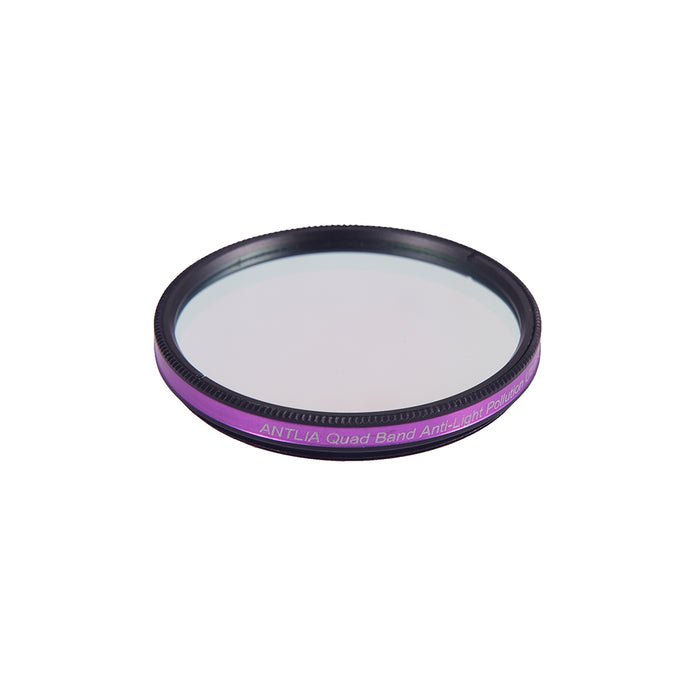
Antlia Quad Band Light Pollution Filter - 2"
Description
International Shipping

International Shipping
The Antlia Quad Band Anti-Light Pollution Filter is a light suppression filter for color and monochrome cameras. It is able to shoot most deep sky objects like galaxies, reflection nebulae, emission nebula, and star clusters from a Bortle 8 location to Bortle 1 as its spectral transmission passes through visible light region, near-ultraviolet (NUV) and near-infrared (NIR) region.
Antlia Quad Band filter has a broad bandpass designed to cope with faster optics up to the f/2 focal ratio.
Considering the high quantum efficiency (QE) characteristics of the latest cameras in the near-infrared region and this region is less susceptible to artificial light pollution, the Antlia Quad Band Light-Pollution Filter adds high transmission in the near-infrared (NIR) band. This spectrum design improves image signal-to-noise ratio and contrast by capturing signals in visible bands and NIR region, while also maintaining ood color balance and being easier to manage in post-processing.
Certain full-spectrum objects like M51, M83 possess significant signal in the near-infrared (NIR) region, you can possibly capture these deep sky objects more contrasted with the Antlia Quad Band filter under light polluted condition.
When using this filter with a camera that has UV/IR cut protective glass, the visible band transmission signal is retained, but the IR cut limits your ability to capture targets with infrared signal.
Therefore, the Antlia Quad Band filter is more suitable for cameras with AR protective glass as they can capture both NIR and visible band signals.
Spectrum Specifications:
|
H-alpha |
S-II |
O-III |
H-beta |
NII |
|
|
Wavelength |
656.3nm |
671.6nm 672.4nm |
495.9nm, 500.7nm |
486.1nm |
658.3nm 654.8nm |
|
Peak Transmission |
>92% |
>92% |
>92% |
>92% |
92% |
|
Blocking |
≥OD4@ 300-1050nm |
||||
|
Filter Thickness |
2mm+/-0.05mm |
||||
The main features and application:
- Anti-Light Pollution
The Antlia Quad Band filter is an effective solution for reducing light pollution, as it cuts out most of the orange-yellow lights from 589nm and part of blue lights from LEDs
- Possible to shoot over 95% of deep sky objects
- Unique spectral design offers more possibilities for astrophotography
- High transmittance of the main emission lines Ha/SII/OIII/H-Beta in the visible region, enhances the astrophotography's high SNR and contrast;
- Near-infrared (NIR) region transmittance
- Passing near infrared region is for shooting deep sky objects that cannot be shot with other filters without NIR transmission
- The broad bandpass designed to cope with faster optics up to the f/2 focal ratio.
- Good color balance
- It is easier to achieve color balance by adding the short-wavelength transmission
- Superior optical reliability reduces post image processing
- Basic Substrate: Optical, Single / Non-glued substrate
- Surface Quality: S/D (scratch/dig)= 60/40 (Refer to MIL-O-13830)
- Transmitted Wavefront: Lambda/4 or better.
- Parallelism: less than 30 arcsec
- Warranty: 3-years against delamination